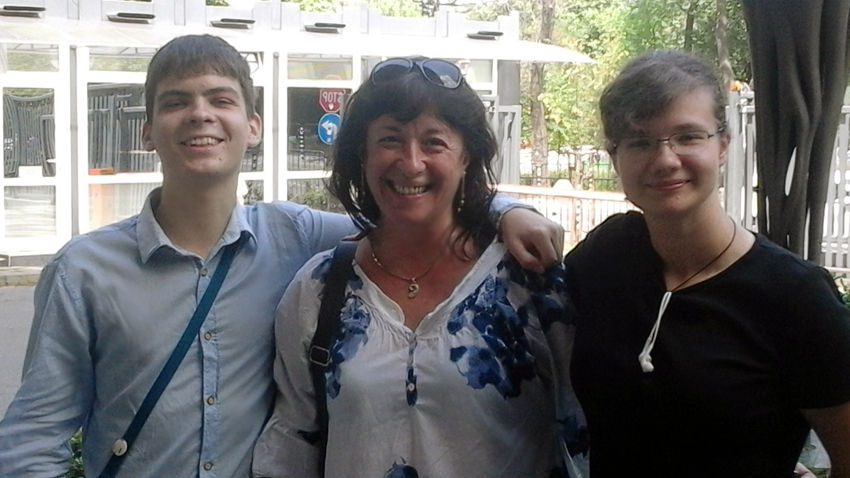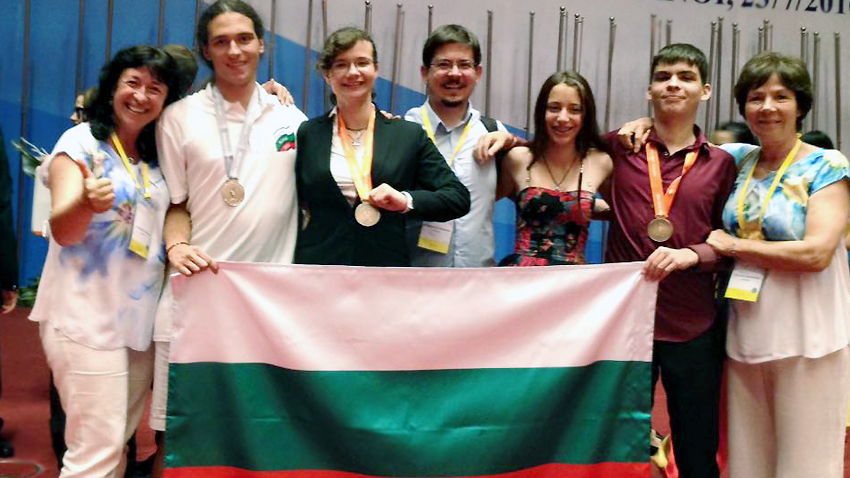The Olympic summer in Rio de Janeiro is in full swing, and we are all eager to see Bulgarian Olympic athletes winning medals. In the meantime, however, another breed of Bulgarian Olympians have been winning medals. They are the Bulgarian high school students who excel at international competitions in mathematics, biology, chemistry and other sciences. Every year close to fifty of them join 15 prestigious competitions. In 2016 Bulgaria has won the total of 67 medals.
All this is happening under the close guidance of the Association of the Leaders of Bulgarian Olympic Teams in Natural Science which has for the past 6 years been organizing specialized training in the respective subjects.
This year the members of the national team in biology were back from the International Biology Olympiad in Hanoi, Vietnam, with one silver and three bronze medals. Bulgaria has a long tradition in this field of science and was one of the six co-founders of the event back in 1989.

What is a biology Olympiad like? More from the national team's coach Associate Prof. Albena Yordanova:
„The International Biology Olympiad includes two big exams. The first is held in four laboratories where practical problems are solved. The second exam is about theory. Our team is expected to make use of up-to-date methods in biology that go far beyond what is studied at school. We attract already well trained young talents who are among Bulgaria's top young biologists.”
„We simply love biology”, says Nikolay Todorov, holder of a bronze medal from the International Biology Olympiad. More on the challenges of getting trained for success, from Victoria Hristova, another bronze medalist.
„We are students at the National High School of Mathematics and Natural Science in Sofia and we have extra classes in biology. In common schools biology classes are only twice a week, and there is no time for enough theory and practice. The Olympiad is at a very high level and this requires a lot of knowledge, long hours of training and perseverance, of course.”

Teachers' work is also vital for the success of students. One of them is a veritable phenomenon. This year's silver medalist Tsvetoslav Georgiev took up biology more seriously a year and a half ago. Until then he was only competing at mathematical Olympiads. Revisiting his success the tutors Associate Prof. Albena Yordanova, Associate Prof. Snezhana Tomova and Radoslav Alexandrov also report about problems they have to wrestle with:
„Unfortunately, the facilities we had two years ago are now nonexistent. The only option of our Olympians to come into touch with present-day science is to come to the Faculty of Biology at Sofia University. We are quite good in theory but practice is paramount. Therefore laboratories should be rebuilt”, contends Albena Yordanova.
Young biologists plan to go to universities abroad after they finish school in Bulgaria. And they will probably pursue their hopefully brilliant careers away from home. So, to be able to motivate some of them to stay in this country, the government must invest much more in talented kids. This way they will become the next generation of innovative scientists and guarantors of Bulgaria's economic progress.
English Daniela Konstantinova
Photos: Bozhidar Yanev and private library
Over 80% of Bulgarians are expected to start using artificial intelligence in the next three years , across all age groups. Today, it is almost impossible to find a Bulgarian student who does not turn to ChatGPT when preparing homework. This..
Serbians around the world mark one year after Novi Sad tragedy On November 1, Serbians abroad will join the call of students in Serbia to mark the anniversary of the collapse of the canopy of the Novi Sad railway..
"We cannot escape from modern technologies, but we must think about how we can use artificial intelligence to improve the quality of education without losing human contact," said Mimi Nicheva, head of the Bulgarian Sunday School "Sts...
The diplomas from the 11th master class in radio journalism of the Bulgarian National Radio – BNR Academy were awarded at a solemn ceremony on November..
The first museum of investment gold is welcoming visitors in Plovdiv who want to learn more about the history of money and its connection to gold – from..
On 16 November, we celebrate Caritas Day, when we honour the Catholic Church’s charity organisation that brings hope to those in need through care and..

+359 2 9336 661
